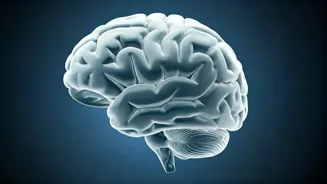Memory Lane Issues
One of the most notable symptoms of brain fog is difficulty recalling information. Picture this: you're in a conversation and suddenly, the name of a familiar
person or place eludes you. This struggle is a common manifestation. The brain might feel like it's working through a thick fog, making it harder to access memories that were once readily available. Bhagyashree's insights point to these memory lapses as a significant indicator. It's not about forgetting everything, but more about the inability to pull information from your memory bank as swiftly as before. This might involve struggling to remember recent events, conversations, or even familiar faces. This reduced cognitive efficiency can create frustration and a sense of mental sluggishness. The key here is recognizing the change in your memory performance and understanding it could be a symptom of brain fog and not necessarily a reflection of your intelligence or cognitive capacity.
Focus and Concentration
Brain fog often manifests through challenges in focusing and maintaining concentration. Imagine trying to read a book, and your mind wanders, or attempting to finish a task and continually getting sidetracked. Bhagyashree highlighted the difficulty in staying focused as another critical sign. This isn't just about being easily distracted; it involves a noticeable reduction in your ability to concentrate for extended periods. Simple things like reading an article or watching a movie become difficult because your mind keeps drifting. These interruptions make it difficult to complete tasks efficiently. This symptom can affect your work, relationships, and daily routines. It's like your brain is battling a persistent static, constantly interrupting your thought processes. If you're finding yourself more easily distracted than usual or struggling to maintain focus on a single task, it could be a warning sign of brain fog.
Mental Clutter Awareness
A less commonly discussed aspect of brain fog is the sensation of mental clutter. It is about feeling overwhelmed or mentally congested, as though your brain is filled with a jumble of thoughts that prevents clear thinking. This feeling can range from a mild sensation of mental fatigue to a more profound sense of confusion or disorganization. Bhagyashree discusses this state as another vital sign to consider when evaluating brain fog. It's as if your mental pathways are blocked or congested, making it difficult to process new information or organize your thoughts. This clutter can manifest as difficulty making decisions, feeling overwhelmed by simple tasks, or experiencing a sense of mental sluggishness. It is important to recognize this feeling and evaluate whether it is a symptom of brain fog. By understanding these symptoms, individuals can become more aware of their cognitive state and take appropriate steps to address brain fog.













